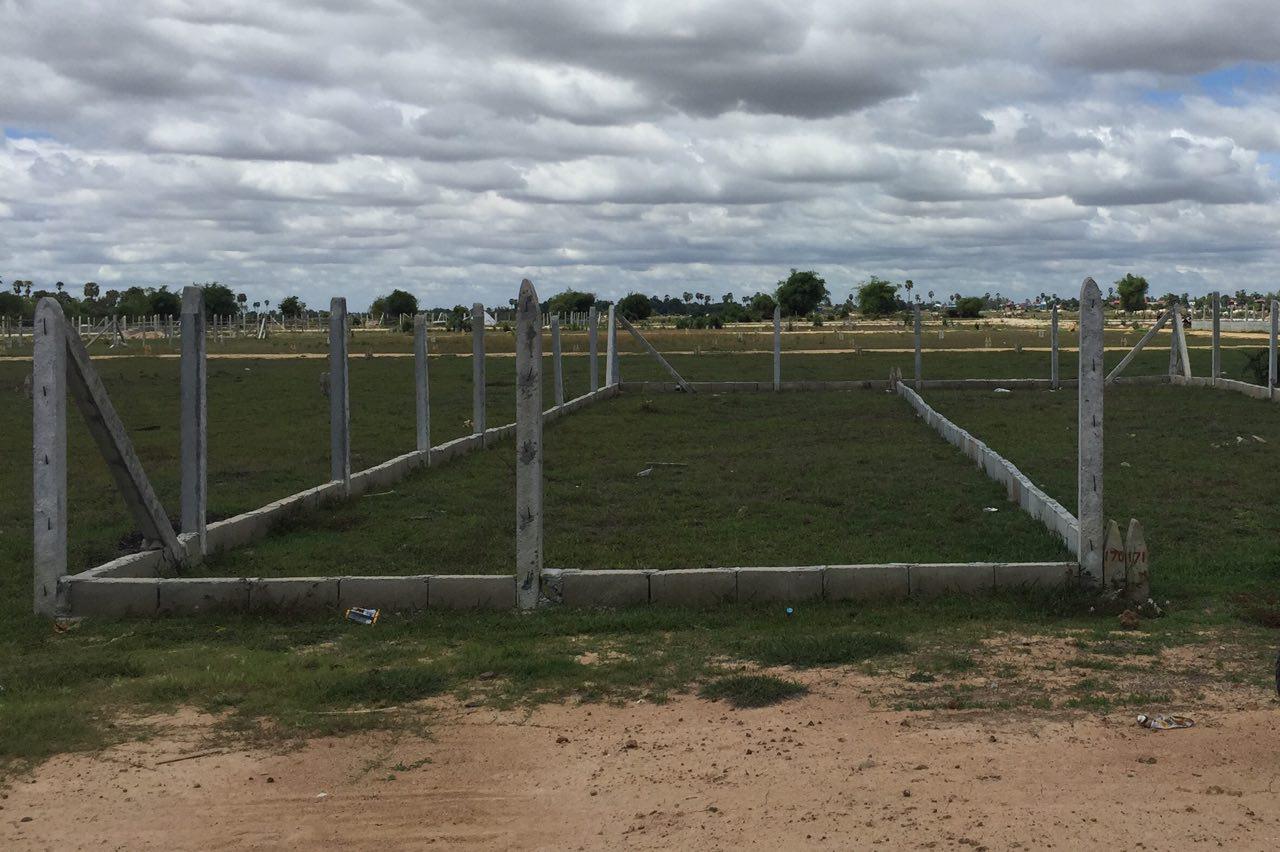Lower middle-income Cambodians flock for land plots despite challenging investment
Economic prosperity along with the rise in lower-middle-income Cambodians is pushing the development of the country’s real estate industry. Over the past decade, the country’s real estate sector has enjoyed strong growth each year, especially within the capital of Phnom Penh and on its outskirts.
Along with this rapid development has been the increase in land prices as more lower-middle-income Cambodians desire houses or land at affordable price points. Reflecting this high social demand, real estate developers over the past few years have transformed hectares of land into small plots of a standard size of 5 metres wide by 20 metres long at a reasonable price around the outskirts of Phnom Penh and in bordering provinces like Takeo and Kandal.
Suitable Pricing
“Because prices are between US$3,000 to US$5,000, [price per plot], it suits a lot of Cambodian people and sometimes developers do not charge interest so they [buyers] first pay US$1,000 then they [buyers] can pay through instalments with little or no interest,” said real estate expert and director of international real estate agent CBRE Cambodia Ms Ann Thida, who pointed out that the low price is the ‘attractive point’ for this trending real estate business.
With more than 800,000 houses needed by 2030 to fulfil demand as a result of an increase in population across the capital of Phnom Penh, the country is facing challenges with its affordable housing development as lower-middle-income Cambodians look for alternative investments like land plots.
“They [buyers] think that for that price they [buyers] can just later add US$5,000 or US$10,000 so they [buyers] can build their own house, because they [buyers] think the total cost is about US$20,000, which is still lower than a house they [buyers] buy in a borey, where the lowest price is US$50,000,” Ms Thida explains.
Land plot buyer
Sitting at a coffee shop on a sunny day, a 23-year-old employed lady who prefers to be called Sophea said that she invested in one plot of land somewhere in the Kob Srov area, a popular site for land plot development on the outskirts of Phnom Penh near Kandal province.
“I bought one plot [land plot] of 5 metres wide by 20 metres long for US$3,500 at Kob Srov, because I want to have land to build a house on in the future,” Sophea said.
While explaining that she first paid US$500 then US$100 monthly for a two and half year instalment period, Sophea said she is happy with her investment as this is her first property despite acknowledging that the investment comes with challenges.
Sophea explained the type of ownership document she expected to receive upon completing her instalment, saying “For this buying [investment] I only will get a soft title and a signature from the Sangkat only, but I think the buying is still good, I will have my own land,”
Challenges for plot investors.
According to Ms Sothida, low prices with flexible payment options and developers continuing to gain profit from the projects are the main reasons for the success of the business although there are risks and challenges for land plot buyers.
“It is a bit of a challenge; most important with land plot developments is the process with title, infrastructure, management, and development, otherwise they [developer] make the whole project suffer,” said Ms Sothida.
The future implication for end buyers
While plot buyers either buy to build a house or to gain profit, those expecting to build a house on the land will need to consider the future implications.
“It also involves the construction because normally the size of 5 metres by 20 metres is a size for a flat and flats must share the same wall, so if one builds and another one does not build, the first builder might suffer when the next one builds,” Ms Sothida explained regarding the risk when the developer does not have master plan or building requirements for plot buyers.
Refusing to be named, a few land plot developers who showcased their projects at a recent real estate exhibition at Koh Pich said “we don’t care about that [future implication], we just sell the land and install pipes, water, and electricity poles,” when asked about implications for buyers in the future.
“Developer must set that out; this land they [buyers] should build a one or two-storey house, and if possible, they [developer] should build the foundations for them. That is good because it does not really impact to the buyer, so this is my opinion because any impact is usually because of foundational,” Ms Sothida explained.
From individual risk to national economic growth leading to laws being put in place
As this business model continues to flourish with more and more Cambodians flocking for plots, it also poses concerns for the Cambodian economy. The World Bank in 2018 said that land plot development poses a concern for the financial sector, citing that the purchase and sale of land plots is a speculative activity with less obvious or justifiable investments returns and an increase in real estate loans.
In the same year, the government also voiced concerns over this activity with a Prakas being implemented to ensure the sustainability of land management and urbanisation, especially for the development of land plots.
“When we have the experience, we start to have laws and order. If they divide the land into plots, what licenses must they now have from the Ministry of Land Management Urban Planning and Construction (MLMUPC)?” asked Ms Sothida.
“If they [developer] have a legitimate title, they are a licensed developer (registered with MLUC if they have 100 plots, they must have 100 titles) and they must develop in accordance with their master plans like installing electricity, pipes and road and property management. Then there is no problem” she added.
- Video Advertisement -



 ខ្មែរ
ខ្មែរ







